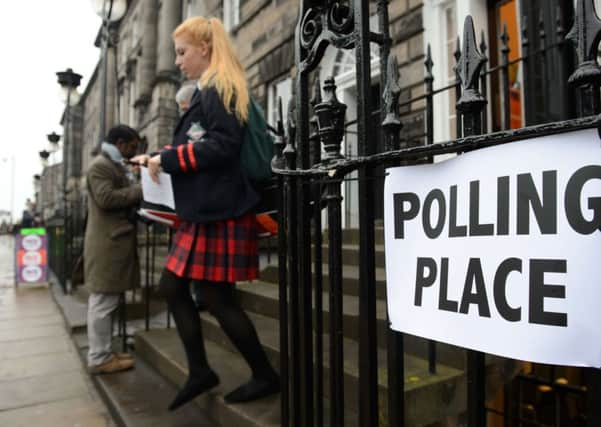Alex Salmond: Referendum made Scotland better


The First Minister, who has already announced his intention to resign after Scotland last week voted to remain in the United Kingdom, said the lengthy campaign had left the country with one of the most politically engaged populations anywhere in the world.
Advertisement
Hide AdAdvertisement
Hide AdBut he warned Westminster leaders that the people of Scotland would not tolerate any delay in them delivering on their pledge of more powers for Holyrood.
Just days before the historic vote, David Cameron, Ed Miliband and Nick Clegg all made a public vow that key powers, including those over tax and welfare, would be transferred to Edinburgh.
They also promised that the Barnett formula, which determines how public funding is divided across the UK, would be kept.
Mr Salmond said Scotland now has “a responsibility to hold Westminster’s feet to the fire to ensure the pledges are met”.
He said: “That’s not just a job for the Scottish Government, it is one for all parties in the Parliament. Indeed we might well argue there is a special obligation on the unionist parties, they promised further devolution, it is essential they deliver.”
But he stressed the “true guardians of progress” are the “energised electorate of this nation”.
He went on to state that the people of the country would not “tolerate any equivocation or delay” in fulfilling the promises.
The SNP leader was addressing Holyrood as MSPs returned for the first time since last Thursday’s vote.
Advertisement
Hide AdAdvertisement
Hide Ad“Scotland now has the most politically engaged population in Western Europe and one of the most engaged of any country anywhere in the democratic world,” he said.
“This land has been a hub of peaceful, passionate discussion, in the workplace, at home, in cafes, pubs and on the streets of Scotland. Across Scotland people have been energised, enthused by politics as has never happened before, certainly not in my experience.”
He said there is now a “totally new body politic” in Scotland, which is “speaking loud and clear”.
Mr Salmond said: “All of us must realise that things will never be the same again.
“Wherever we are travelling together we are a better nation today than we were at the start of this process, we are more informed, more enabled and more empowered.
“As a result of that our great national debate in my estimation will help us make a fairer, more prosperous and more democratic country. In all of that, all of Scotland will emerge as the winner.”
With 85 per cent of the electorate taking part in the referendum, the turnout was the “highest for any vote on this scale ever held on these islands”, Mr Salmond said.
“This has been the greatest democratic experience in Scotland’s history and it has brought us great credit, both nationally and internationally.
Advertisement
Hide AdAdvertisement
Hide Ad“The true story to emerge from the referendum is that Scotland now has the most politically-engaged population in Western Europe.”
He said the Scottish Government would bring forward “constructive proposals” for what changes should now be made to the UK’s constitutional set-up.
But with the Prime Minister now linking further devolution to changes in England, Mr Salmond said this could throw the process in Scotland “into delay and confusion”.
With regards to new powers for Holyrood, he said: “In the Scottish Government’s view the enhanced devolution settlement should pass three key tests - it should enable us to make Scotland a more prosperous country. In particular, genuine job-creating powers are important.
“It should allow us to build a fairer society, we need to address the deep-lying causes of inequality in Scottish society, and it should enable Scotland to have a stronger, clearer articulated voice on the international stage.
“We need to ensure that the powers delivered to this Parliament match not just the rhetoric but also the ambitions of the people of Scotland.”
He stressed the need to maintain the Barnett formula, saying it is “vital that new economic powers do not in any way disadvantage Scotland”.
Advertisement
Hide AdAdvertisement
Hide AdMr Salmond said: “The Barnett formula promise is essential, until or unless Scotland has control of all of our own resources.”
He also said the Scottish Government wants to “ensure that the Scottish Parliament is entrenched in legislation” so it “can never therefore be abolished or diminished by Westminster”.
The SNP leader added that this had also been promised prior to the referendum, but was “missing from the motion at Westminster”.
He said: “Overall there is a great opportunity for this Parliament, together, to help the UK Government deliver its promise of significant extra powers for this chamber.”
The referendum was the first time that 16 and 17-year-olds across Scotland were allowed to take part in a national ballot.
Mr Salmond said there is now an “unanswerable case” for this age group to be given the vote in all UK elections, as he urged party leaders at Westminster to make the change in time for next May’s general election.
Mr Salmond, who opened today’s debate at Holyrood on the future of Scotland, said: “There is not a shred of evidence for arguing now 16 and 17-year-olds should not be allowed to vote.
Advertisement
Hide AdAdvertisement
Hide Ad“Their engagement in this debate, this great constitutional debate, was second to none. They proved themselves to be the serious, passionate and committed citizens we always believed they should be.
“Everyone in this chamber should be proud of this chamber’s decision to widen the franchise. There is an overwhelming, indeed an unanswerable, case for giving 16 and 17-year-olds the vote in all future elections in Scotland, indeed across the United Kingdom.
“All parties in this parliament I think should make a vow to urge Westminster to make this happen in time for next year’s general election.”
SEE ALSO